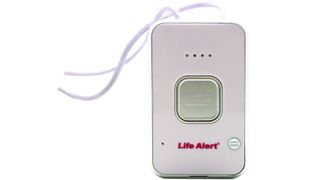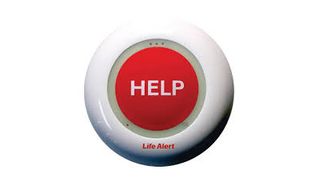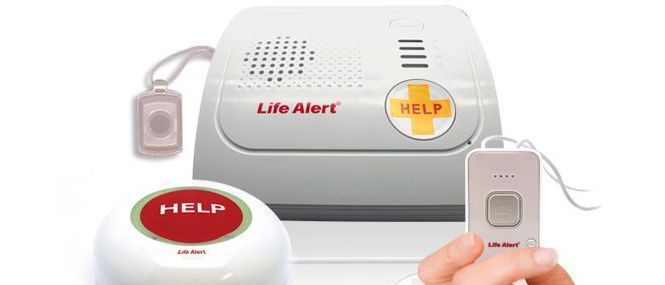If you're in need of a medical alert system, you'll want to check out our thorough reviews and our complete guide to the best medical alert systems. Read on for our review of the Life Alert system.
Life Alert: What you need to know
Life Alert is one of the best-known medical alert systems with its marketing phrase, “Help! I’ve fallen and I can’t get up”, instantly recognizable. Strangely, for a company like this, its website is devoid of much useful information, including pricing, which makes finding out more much harder. In fact, you have to call the sales line to get any information.
This, combined with a three-year contract makes the service harder to recommend, particularly with the very mixed user reviews. You’ll most likely be better off with one of our alternative best medical alert systems.
Life Alert: Price
Life Alert doesn’t advertise its product fees, and you have to phone and talk to a sales representative to get full pricing information. This makes it harder to get a clear overview of the service before buying and to list the packages and devices that you need. Here, we’ve rounded up the current information that we have and the packages that Life Alert offers.
Life Alert: Medical emergencies
The basic Medical Emergencies package gets you a base station, which can be connected to a telephone line or via cellular, and a wearable emergency button (wristband or pendant) that can be pressed to call for help.
The system has a decent quoted range of 800-feet, although if you live in a bigger home and need more range, the LifeFone system may be better for you. In the event of a power failure, the back-up battery of the base unit is designed to last for 72 hours, while the alert button has an integrated battery that lasts for seven years.
There’s no option for fall detection with this package (or any other). Prices begin with an upfront cost of $95 and then there’s a monthly cost of $49.95 on a three-year contract.
Life Alert: Shower emergencies
Free cancellation: No
System price (starts at): $95
Monthly costs (starts at): $49.95
In-home monitoring: Yes
Outside monitoring: Yes
With Shower Emergencies, you get the same as above, but you also get an additional help button that can be installed in your home. As you can guess from the name, Life Alert suggests that this button is installed in the bathroom.
This package has an upfront cost of $96 and costs $69.95 a month on a three-year contract, including the Medical Emergencies service as above. Even so, this makes Life Alert one of the most expensive services available.
Life Alert: Mobile + GPS

If you want coverage inside and outside the home, you can take all of the above and add-in a cellular button with built-in GPS that can be carried in a bag or worn around the neck. Combining all three options costs $198 upfront with an $89.95 a month fee on a three-year contract.
Life Alert says that its mobile button can last for up to 10 years on the integrated battery, which eliminates charging times at least. There are no additional features for this device, such as being able to track a loved one’s location.
Life Alert: Extras
A spouse can be covered for an extra $10 a month, although you also have to pay for additional hardware for them to use. Outside of this, the service can include home intrusion protection, with the Life Alert monitoring center able to dispatch police to your address.
There’s also a mobile app available that will work on all smartphones, giving you a portable way of getting in touch with the call center. The system can be professionally installed, although it was difficult to get costs for this.
Life Alert: Warranty and Cancellation
Life Alert doesn’t have a free cancellation period, so once you’ve signed up, you’re locked into the three-year contract. There’s also no option to get out early unless you can provide documentation that the person covered has either died or has been moved into a nursing home. This has proved tricky for some customers to prove, leaving them with an expensive contract to pay while they work things out.
There’s a Lifetime Free Warranty for all Life Alert products, which covers all of the kit you have. However, some people have said that a lost pendant cost them $49 to replace, so it’s another thing to look out for.
How does Life Alert deal with an alert?

In the event of a problem, an alert button has to be pressed, which connects you to the Life Alert monitoring center. Life Alert owns and operates all of its US-based monitoring centers. If you can talk, the service can be used to dispatch police, fire services or EMT staff, plus the system can be used to connect to a doctor. If you’re incapacitated, Life Alert will dispatch help to your address (or location if you use the mobile device), informing the people on your call list.
Life Alert maintains detailed medical information on its customers, including any medication being taken and who to call in the event of a problem. This information can help inform medical staff about the best way to proceed.
Life Alert: What the users say
Getting a full overview of a medical alert system like this means finding out what real users have to say, after they’ve been in real emergencies. To do this, we’ve turned to well-regarded user review websites to collate the most important information.
Reviews are very mixed about the service, with the company scoring 2.7 on Google out of 32 reviews, and 4.9 on ConsumerAffairs out of 484 ratings. For those that didn’t like the service, there are complaints from people finding it hard to cancel despite having the necessary paperwork, and people finding out late about the long contract requirements.
For those people that liked the service, they praised the speed of response and how Life Alert contact family and friends on the call list. In this regard, Life Alert performs very well.
Life Alert: Verdict

Scoring Life Alert is very hard, largely down to how little information the company provides. Via its website, it’s extremely difficult to find any information, and you have to call to make an order. With long contracts, comparatively high prices and limited features, including no fall detection, there are better value options, such as Bay Alarm Medical. Then there’s the issue of the long contracts, which can be hard to get out of without the required paperwork.
On the flip side, there’s a large gulf between people that don’t like the system, and devoted users that have found the monitoring center to be one of the best, with excellent support in emergencies. On balance, Life Alert can’t be ruled out completely, but there are more open companies with lower prices and a wider range of options that will make a better choice for most people.

